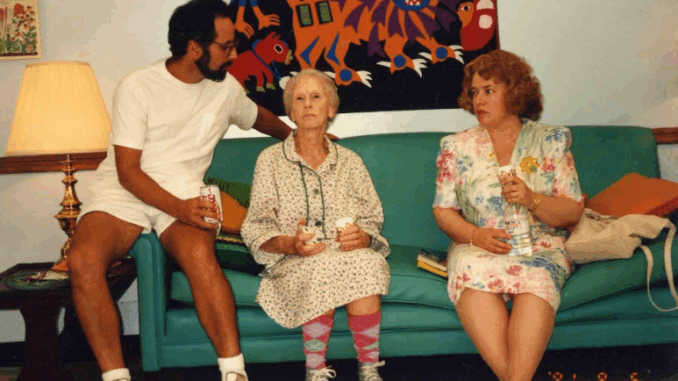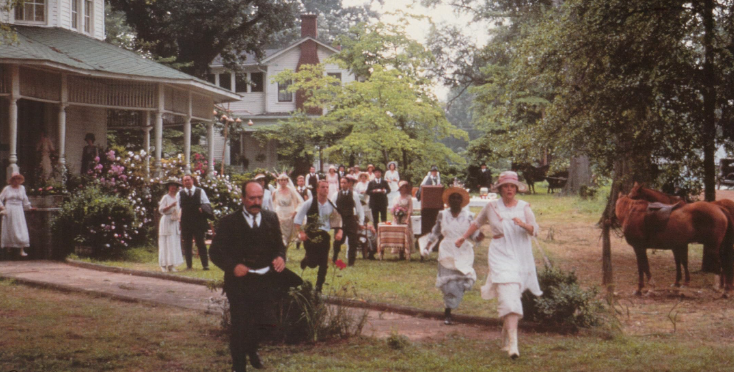
Fried Green Tomatoes is a film where small-town life, personal trauma, and fierce friendships take center stage — but beneath its vivid characters and dramatic events lies a spiritual current that carries the story forward: the presence of faith, forgiveness, and quiet redemption. Religion is never forced upon the viewer, but it lingers like background music, deeply influencing the decisions and transformations of many characters.
Ruth’s Quiet Faith: Strength in Silence
Ruth Jamison is the most openly religious character in the film. Early scenes show her leading Bible study classes, reading Scripture, and gently urging others to do good. But unlike depictions of zealotry or dogma, Ruth’s faith is quiet, tender, and rooted in compassion.
Her decision to leave Frank Bennett — her abusive husband — is not made lightly. While some might see this as a rebellion, for Ruth it’s an act of self-preservation inspired by divine love. She believes in a God who values her life, not one who demands suffering. Her choice is a spiritual awakening, asserting that surviving abuse is not a sin.Idgie and Moral Grace Beyond Religion
Idgie Threadgoode, in contrast, is a self-declared skeptic. She mocks preachers, skips church, and prefers whiskey over sermons. But in her own way, Idgie lives a deeply moral life — protecting the vulnerable, defying racism, feeding the hungry, and fiercely loving those around her.
This juxtaposition challenges the viewer: Does goodness require formal religion? Through Idgie, the film answers no. Her ethics are rooted in loyalty, love, and action — perhaps a more Christ-like model than many devout followers display.
The Scene in the Revival Tent
One of the most symbolically rich scenes is Idgie dragging Buddy Jr. (Stump) to a fiery Southern revival meeting. While she rolls her eyes and makes sarcastic quips, there’s irony in the moment: Idgie herself is experiencing a kind of redemption, reconnecting with her community and opening her heart to family.
The fire-and-brimstone preacher may shout about salvation, but Fried Green Tomatoes suggests that true salvation lies in forgiving yourself and finding someone who believes you are worth saving — like Ruth does for Idgie.

The Courtroom and Forgiveness
When Idgie is on trial for the suspected murder of Frank Bennett, the courtroom becomes a stage for something more than justice — it becomes a ritual of communal redemption. Friends testify. Secrets are carefully hidden. Even the judge, in allowing the case to close, seems to recognize that justice isn’t always served best through punishment, but sometimes through understanding and mercy.
Ruth’s Final Moments: Faith, Fulfilled
Ruth’s death is one of the most emotional moments of the film. Surrounded by those who love her, she passes in peace. Her final words are not quoted Scripture but expressions of deep connection — a life of faith fulfilled not through piety, but through love.
In her death, she leaves behind not only a grieving Idgie but also a legacy of empathy, nonjudgment, and strength — spiritual qualities that resonate beyond church walls.
Evelyn’s Rebirth: A Modern Parable
In the modern-day storyline, Evelyn Couch undergoes a spiritual transformation of her own — not through sermons, but through storytelling. Ninny’s tales inspire her to believe in herself again. She rediscovers agency, sheds shame, and learns to forgive the world for undervaluing her.
In a way, Evelyn becomes a “born-again” woman — not in religious terms, but in reclaiming her voice, her body, her power.
Redemption Is Not Always Loud
Fried Green Tomatoes does not preach, but it guides. It shows us that religion can offer refuge, and that faith may arrive in whispers, through a friend’s touch or a shared meal, not necessarily through grand cathedrals. It suggests that true redemption begins when we forgive — ourselves and each other.
